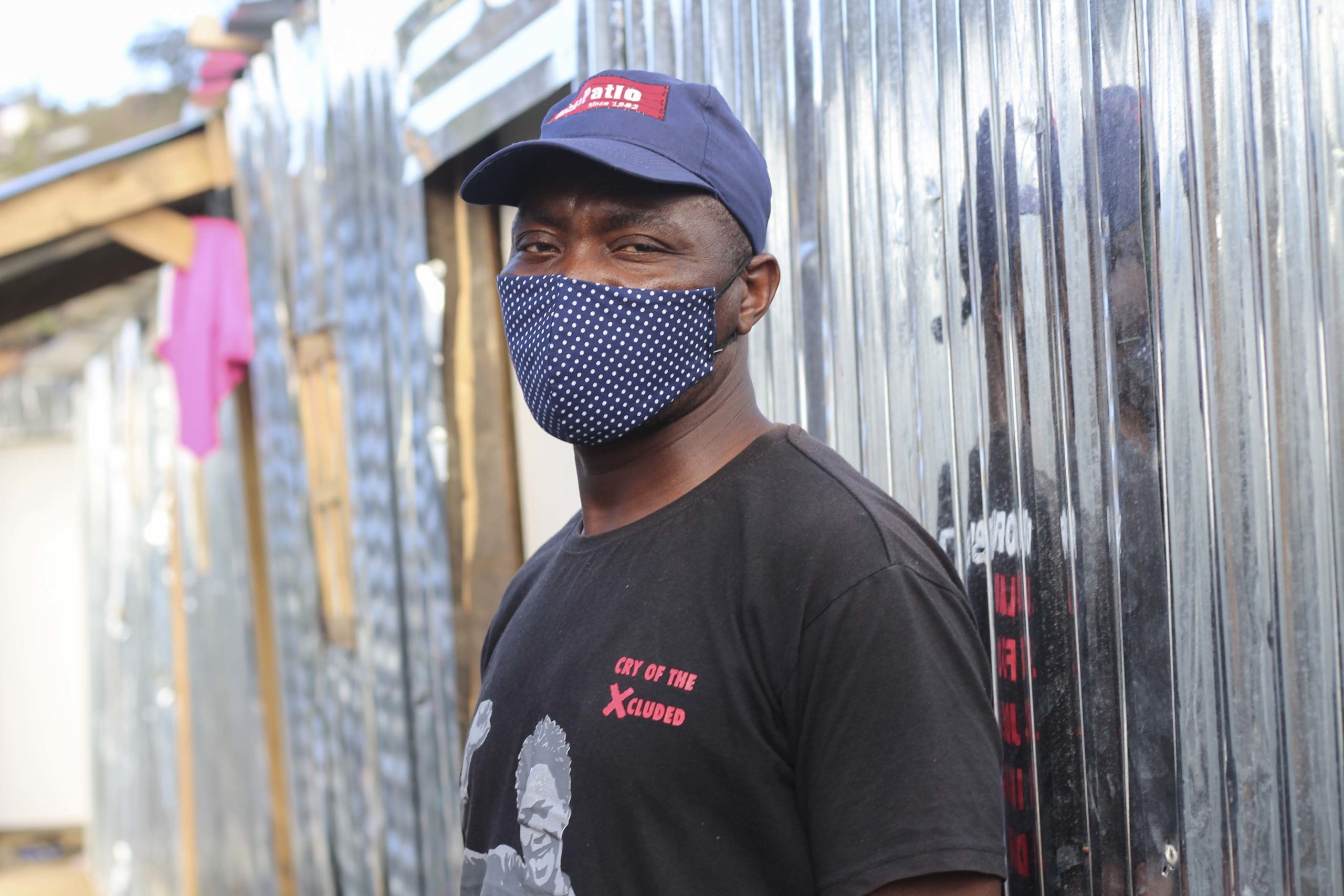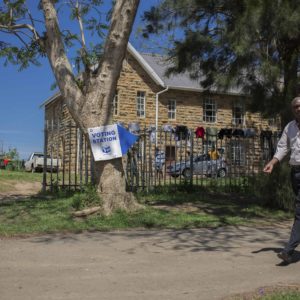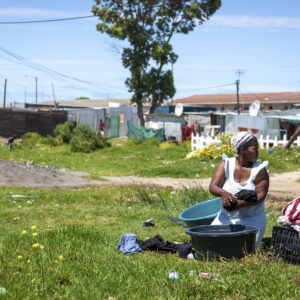Briardene residents are out there ‘on their own’
Residents in the shack settlement in Durban North are caught between an apathetic municipality, a government they say wants them to ‘remain this way’ and greedy landlords.
Author:
4 November 2021

More than three months after a fire tore through the settlement of Briardene, reducing it to ashes during the riots in July, residents say they are struggling to rebuild their lives without adequate “access to electricity, ablution and decent housing”.
The settlement is home to about 280 residents, all of whose homes were destroyed in the fire on 14 July that they say broke out around 3pm. At the time of the fire, the intensity of the riots and violence, which ultimately claimed more than 300 lives, had peaked. The initial food riots were giving way to generalised looting of shopping centres, factories and warehouses, and infrastructure was burned and vandalised.
A factory and electricity substation close to the Briardene settlement had been burnt. Amid the chaos, the residents’ self-connected electricity supply had collapsed. They had been without power for a week and many made fires outside their homes to cook food. This may have caused the fire, but some suspect pro-Zuma forces of starting the blaze deliberately.
Related article:
Without emergency fire assistance, the area quickly turned into ash and rubble, with every home gutted. For three weeks, residents lived in a tent donated by Doctors Without Borders.
The community, which is affiliated to shack dwellers’ movement Abahlali baseMjondolo, survived on food from other Abahlali baseMjondolo branches, the Amadiba Crisis Committee and neighbours in the immediate aftermath, as well as donations from an Islamic charity and local non-governmental organisations after the fire.
The Briardene tragedy reveals the often ignored urban marginality and social insecurity that is everyday life for shack dwellers.
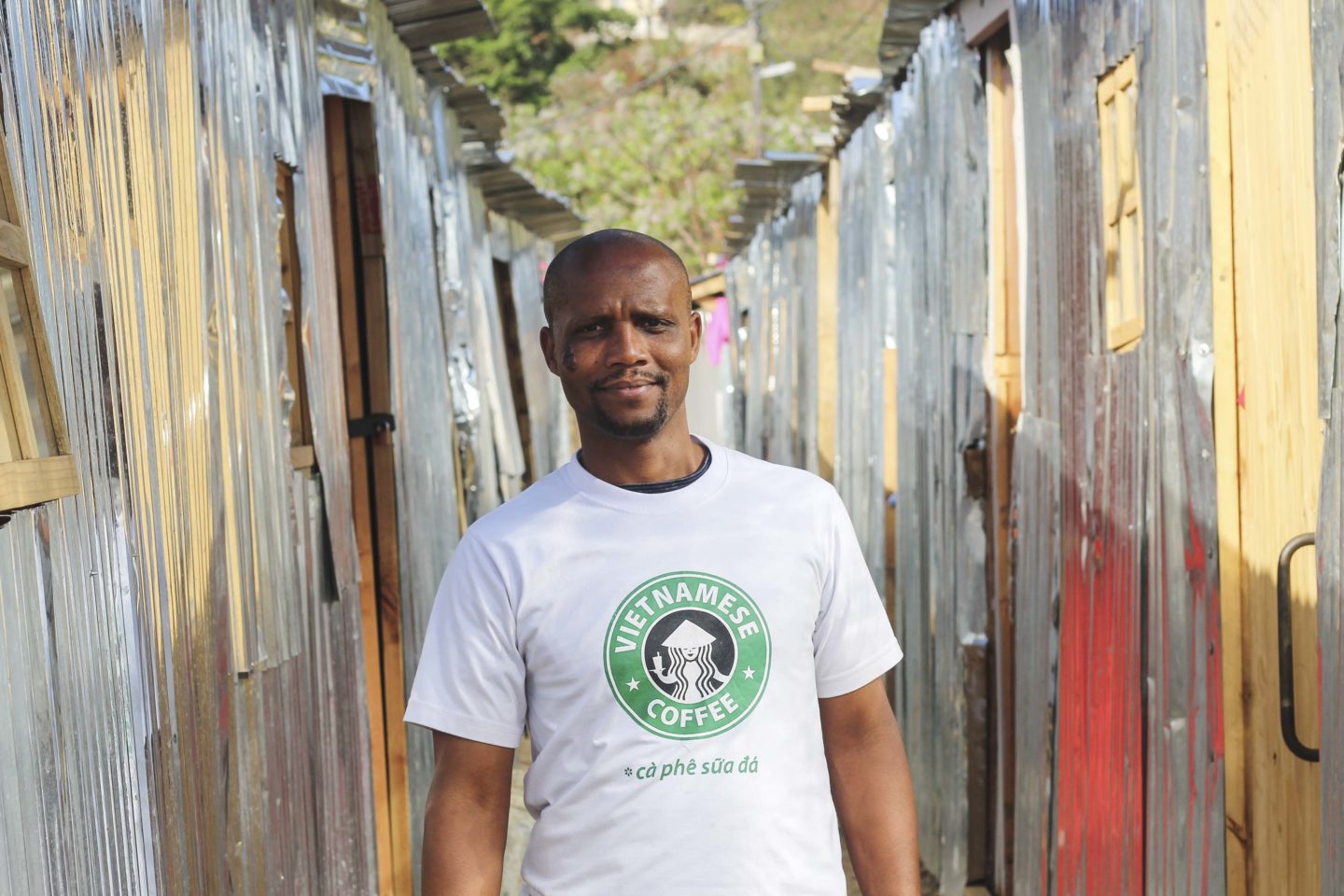
Ownership battle
Thuso Mohapi, 38, an elected community leader in the settlement, says the residents’ longstanding call for formal access to water and electricity, and especially better homes, has been ignored. “Informal settlements exist in the background, hidden and discarded. The municipality came and provided us with building materials, to build smaller homes attached to each other, without any pathways, water, ablution or electricity,” he says.
The Briardene shack settlement is close to the wealthy suburbs in the north of Durban. It is reached by a steep slope, a road that is also a playground for children. Newly built pit toilets stand in a row on the side of the road, recently provided by the eThekwini municipality.
Since its establishment, the settlement has been caught up in an ownership battle between private landowners, the community and the municipality. Residents remain without electricity and rely on self-organised connections.
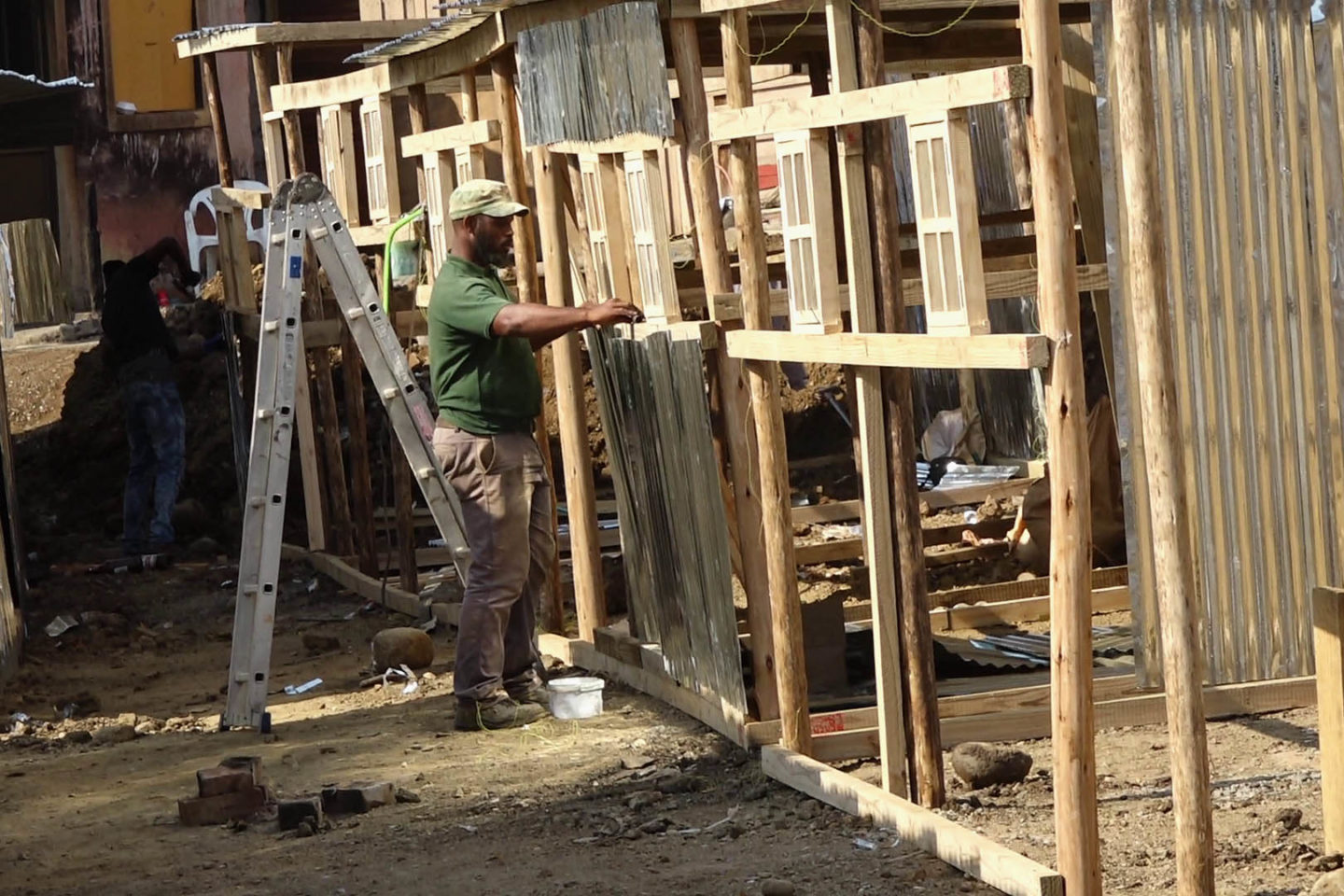
Socio-Economic Rights Institute of South Africa executive director Nomzamo Zondo says the link between location, infrastructure and the systematically constructed pattern of vulnerability and risk is a reflection of an unresolved past. “With the adoption of the Upgrading of Informal Settlements and Emergency Housing Programme post 2004, there was an understanding that the state needed to urgently address the conditions of the people living in informal settlements. Unfortunately, the state has carried the attitude of the apartheid governement, indicating that people in shacks are on their own.”
Zondo says social factors as well as the underlying structural conditions make social disasters such as shack fires inevitable.
“Every year, fire is a reality in the informal settlements. It is always expected, especially in winter. Loss of life, property and homelessness has become normal to the people in shacks, but the state does not act in a way to prevent these fires. If people are lucky, they are given building material, or left on their own altogether.”
‘Reduced to this cubicle’
Three weeks after the fire, Briardene residents prepared to rebuild when building material provided by the state arrived. The municipality delivered 14 sheets of corrugated iron, 12 wooden planks, eight poles, a door and two windows, in addition to two bags of cement and sand, for each household. The state has not always provided building materials after fires, so this is a gain won from struggle. But the materials were only enough to build a 3x3m or 3x4m structure, and the municipality missed a chance to come up with a better housing solution.
Residents started by clearing and cleaning what remained, placing the rubble in piles for trucks hired by the City to remove. Then the rebuilding began. Hammers were pounding almost in synchrony with the scraping of cement on the ragged floors. Each household was trying to get their home rebuilt as fast as they could. Homeless and without a plan for long-term improvement, residents took what they were given and are now living permanently in what are effectively transit homes.
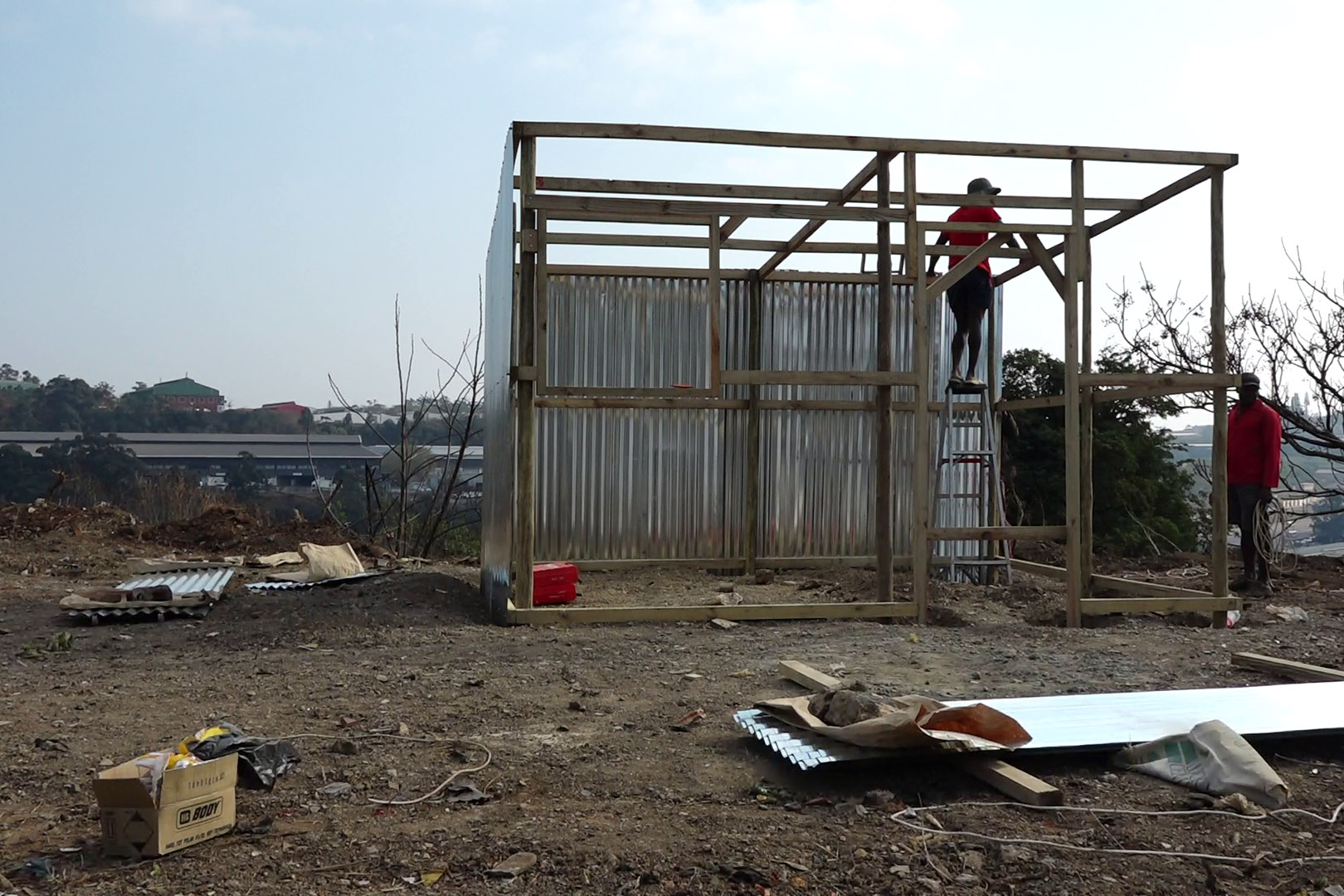
Bathabile Makhoba, 42, has been a resident of the Briardene settlement for 23 years and is a community leader. She was using a plastering tool to level the wet cement foundation for her new home.
“We had no choice. My previous home was two rooms, now I am reduced to this cubicle to share with my children. I am particularly angered by the fact that the municipality has the capacity and budget to build us much smaller, compact and undignified structures like this.
“When our homes burn down, instead of giving us electricity and decent homes, they give us the same flammable material. The message here is that we should remain this way. It profits the councillors who are forever deceitful and greedy. The shack dweller is on their own,” says Makhoba.
Related article:
Zondo suggests that if the state provided infrastructure, including electricity, safe and secure sanitation, and measures to prevent fires, shack dwellers would be able to “build a better future”.
“When the fires destroy their homes, residents have to start their lives from scratch, all the time. For someone who is already living below the poverty line, it plunges them into further impoverishment as they once again use all their money trying to rebuild their homes.
“People living in informal settlements are caught in a cycle that often cripples any form of economic prosperity. They often lose everything and the hope they had and all over again, they are forced to live a life of survival as their present reality gets darker and more harder. If they were given the opportunity to save whatever earnings they make, their lives would gradually improve,” says Zondo.
A good plan defeated
Mohapi says the aftermath of this fire has divided the settlement. He claims some residents, who are not members of Abahlali baseMjondolo, refused to accept community planning. This was to ensure that homes were rebuilt with enough space for pathways and front yards. But these residents had been renting out shacks and wanted to maximise the number of shacks on their land.
“As Abahlali activists, we called a meeting after the fire to discuss the plan ahead for the community. Everyone in that meeting realised that the fire had provided us an opportunity to finally have standalone homes, where there would be space and dignity. We agreed that we no longer needed to live in cramped and crowded environments.
“The plan seemed to be supported, but as the weeks went on, people with no interest in improving the living conditions quickly sabotaged the others. There are some people who had owned up to 10 shacks, they were making a living through the rent. When we were suggesting bigger homes and safe spaces, we were threatening their livelihoods. Transit camps provide a substandard life meant to be temporary but is always permanent. In the end, the idea to have homes with dignity was defeated,” says Mohapi.
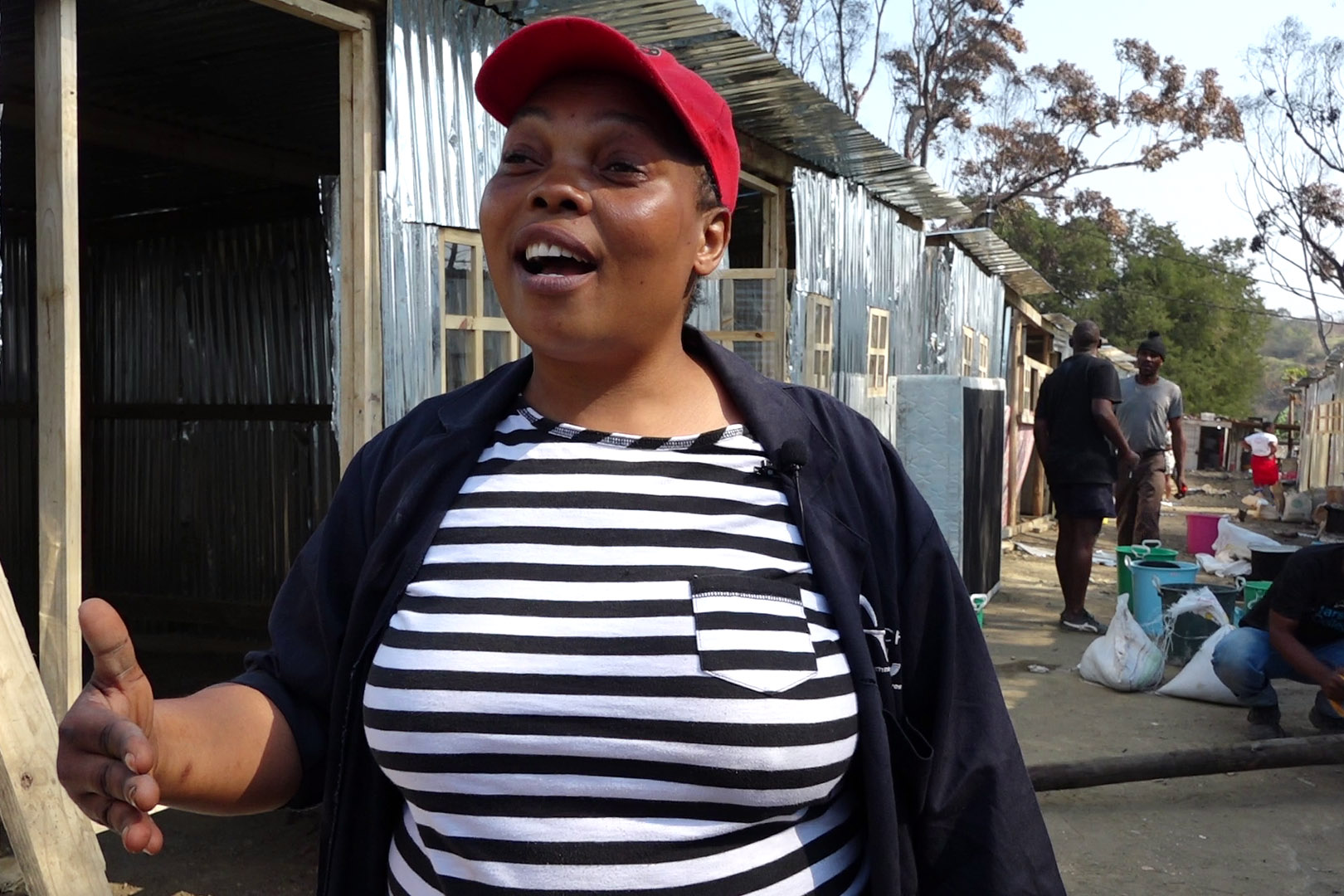
The eThekwini municipality excluding migrants from receiving building material further divided residents. About 20 migrants, who have been living in Briardene for years, were left stranded. Abahlali baseMjondolo issued a statement after the fire, on 24 July, calling for unity and condemning the municipality’s action as “xenophobic incitement”. It helped some of the migrant residents rebuild their homes on the hilltop in the settlement.
“When the ANC says that people who it does not consider to be South African are not entitled to support after a disaster, it is not only being inhumane, it is also actively and deliberately creating divisions between residents,” says the statement.
Landlords’ narrative
Venansio Mussacate, 46, from Inhambane, Mozambique, says he was denied building material because he does not have a South African identity book.
Mussacate, who survives on informal carpentry work around the area, says the exclusion of migrants in the settlements was propagated by certain angry landlords who had been renting out shacks.
“I have lived peacefully in this settlement for 14 years. During a time of violent evictions when the municipality, the police and the people who claim to own this land were against us, all of us united and fought for this place. I feel a sense of betrayal because all of these years, we have been neighbours beyond borders, but now we no longer fit in.
“In the end, we were cast aside with no aid from the municipality. The shack landlords were the ones leading the narrative that we must not be assisted because we do not belong in this country. Instead, they wanted to use the space where some of our homes were to build shacks for renting.”
